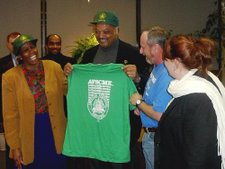
On Thursday, May Day, the International Longshore and Warehouse Union will declare an eight-hour strike to protest the war in Iraq. Since the ILWU controls every port along the U.S. Pacific Coast, including Seattle and Tacoma, this strike demonstrates the collective power of workers willing to use it.
The ILWU is demanding “an immediate end to the war and occupation in Iraq and Afghanistan and the withdrawal of U.S. troops from the Middle East.” Although the majority of Americans repeatedly have expressed their desire to end the war, President Bush has not obliged us, so it drags on. Because our leaders refuse to listen, ILWU members are taking the next logical step for workers: Strike.
For those unfamiliar, the ILWU is perhaps the most militant and politicized worker organization in the nation. It operates in one of the most important sectors of the world economy — marine transport — and, thus, is in a strategic location to put peace above profits.
Forged in the fires of 1930s worker struggles to gain basic rights, the ILWU was born in 1934 when longshoremen (there were no women in the industry then, though there are now) performed the incredibly hard, dangerous and important work of loading and unloading ships. To improve their wages and wrest some control over their lives, men all along the coast struck — and in a few instances died — to gain union recognition.
The ILWU is highly democratic. A caucus of more than 100 longshore workers representing every union local establishes policies for the Longshore Division. It was this caucus that voted to declare the May Day strike.
Dockworkers, including those in the ILWU, have a proud tradition of political action. For example, in the 1980s the ILWU respected the strike of British dockworkers by refusing to unload a ship worked by scab labor. Just last week, union longshoremen in South Africa refused to unload a Chinese vessel carrying military supplies destined for autocratic Zimbabwe — a tremendous example of solidarity.
That the ILWU chose International Workers’ Day to declare this strike suggests its political commitment and internationalism. Around the world, workers honor labor by taking a holiday. What few Americans know is that the tradition of a May Day strike originated not in the Soviet Union in the 1950s but the United States of the 1880s.
These days, such examples of worker power are increasingly rare in the U.S. The tragedy is that, historically, labor activism gave us the 40-hour workweek (and the weekend) and helped humanize the exploitative excesses of unregulated capitalism. As income inequality continues to grow in the United States, it is wise to remember how, in the past, strong unions created a larger middle class as well as a more democratic and egalitarian nation.
The ILWU strike also reminds us that unions still have an important role in public discussions beyond the workplace. As a democratic institution, the ILWU is precisely the sort of “civic society” that the Bush administration has been trying to create in Iraq. On May 1, dockworkers will speak loud and clear — end the endless war in Iraq. Other American workers who want to support our troops by bringing them home can make their voices heard by joining with the brave men and women of the ILWU and taking the day off.
Peter Cole is an associate professor of history at Western Illinois University in Macomb, Ill. His book “Wobblies on the Waterfront: Interracial Unionism in Progressive-Era Philadelphia” was published by the University of Illinois Press.
http://www.commondreams.org/archive/2008/04/30/8612/
©1996-2008 Seattle Post-Intelligencer






No comments:
Post a Comment